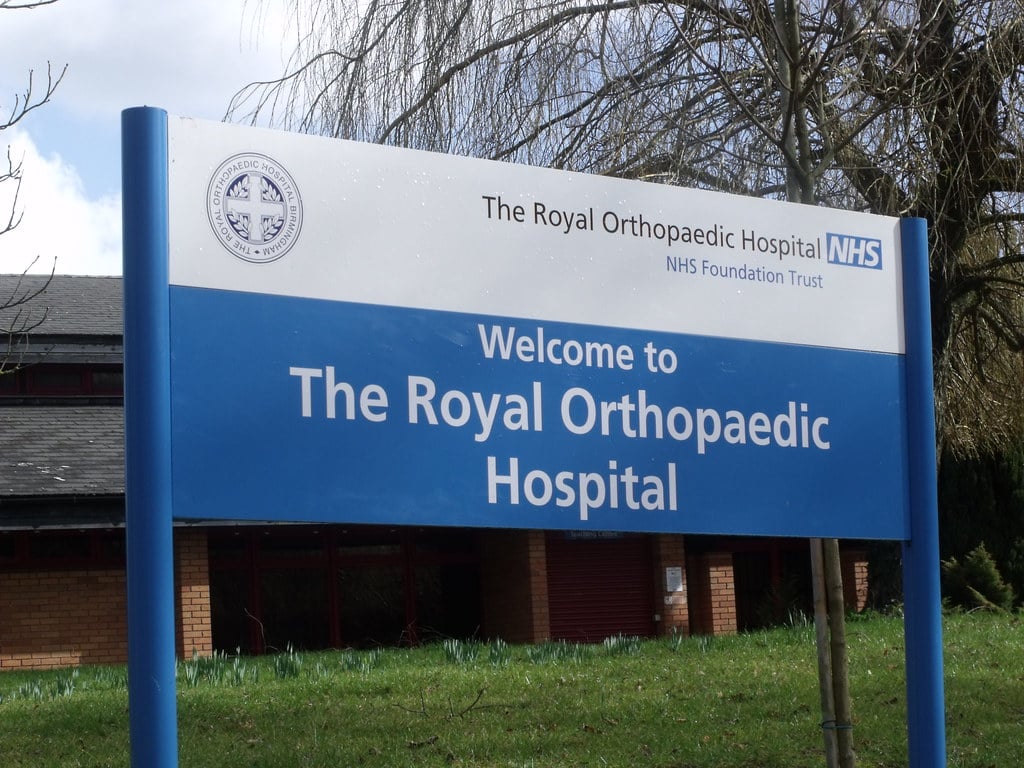Learn how together we've reduced 'did not attend' (DNA) rates by 35%
Customer story
Reducing DNA rates at the Royal Orthopaedic Hospital

Overview
The Royal Orthopaedic Hospital NHS Foundation Trust (ROH) started 2017 with a Did Not Attend (DNA) rate of 10.9%, and were using a non-interactive text messaging reminder system. Although below the national average, as a high performing specialist centre the Trust partnered with DrDoctor to improve this further by implementing Appointment Management.
Within nine weeks, the overall DNA rate was reduced to 7.1% (35% improvement) in the clinics where DrDoctor is turned on; the estimated 2019-2020 full year equivalent financial benefit for the Trust is over £100,000. This case study describes the onboarding process for DrDoctor’s platform across ROH, the results delivered and the next steps for the partnership.
reduction in DNAs
projected annual savings
roll-out time
Introduction
The vast majority of patient interactions with secondary care are through outpatient clinics. In fact, 85% of all UK hospital-based activity (excluding A&E) is accounted for by outpatient appointments. One in five potential appointments in England, and one in four appointments in Wales, are cancelled or reported as DNA.
A recent OFCOM survey showed that smartphone ownership in those aged over 60 years was at 72%, and over 90% for the remainder of the population.
Before partnering with DrDoctor, ROH’s DNA rate for the clinics that were identified as in-scope for DrDoctor were at a high baseline of 10.9%. Clearly, there was an opportunity to leverage mobile technology reduce this, while improving the quality of care for patients.
ROH partnered with DrDoctor in 2019 to implement Patient Platform and Appointment Management, with a view of rolling out Digital Letters and Patient-led Booking as a second phase. To make life for hospital users simple, and in line with recent national pushes to reduce login time, this was provisioned with Seamless Single Sign on Solution, utilising Active Directory Integration.
Solution
Appointment Management was implemented to improve efficiency and patient experience throughout the Trust. Specifically, ROH needed to:
-
Reduce DNA rates
-
Generate realisable financial savings
-
Improve administrative efficiencies
-
Digitise outpatient services

Figure 1. Examples of the patient experience at ROH. The above screenshots demonstrate the text messages patients receive at ROH, and the online Patient Portal where patients can view and reschedule their appointments online, and access appointment, location and clinic-specific information.
Implementation
In order to achieve benefits quickly, ROH rolled out Appointment Management in all selected clinics, which accounts for 70% of all outpatient clinics, in nine weeks. The Trust had a dedicated Programme Manager from DrDoctor on-site throughout this process - enabling the Trust to quickly start to see tangible improvements to DNA rates and patient satisfaction. Figure 2 details the delivered timeline for this implementation of Appointment Management at ROH.

Figure 2. Completed implementation plan of DrDoctor’s Scheduling at ROH. 70% of clinics were live within nine weeks, and the entire implementation process was completed within ten weeks. Success, an ongoing work stream to maximise the benefits of Appointment Management, will continue to run indefinitely.
DrDoctor were engaged throughout the process and worked closely with the operational team to ensure that the system was set up quickly, and thorough testing was undertaken to make certain that there were no technical issues at “go live”
Matthew Payne,
Clinical Services Manager, Senior Responsible Officer, The Royal Orthopaedic Hospital
Outcome
Integration with iPM was successfully completed in the technical integration phase. By the end of the project on 7th June 2019 all required staff at ROH were trained and on-boarded to use DrDoctor.
Within a week, there was a reduction in DNA rate, showing a clear correlation to the send rate of DrDoctor messages, as seen in Figure 3. The DNA rates in the specialties where DrDoctor was turned on dropped from an average of 10.9% to 7.1% (35% improvement), as shown in Figure 4. Annual projected cashable savings, as seen by the Trust, is over £100,000. This is the projected figure for final savings across the entire Trust; if results were filtered to just clinics where DrDoctor is switched on, the savings and efficiency gains figures are likely much higher.
The context of these results is particularly important, as ROH already had a better than average DNA baseline. 10.9% to 7.1% is much more difficult than a reduction from a very high baseline e.g. 15% to 10%. Once DNA rates dip below 10%, a focused effort is required to continue improvement. This is because simple SMS reminders produce diminishing returns. Results at this level require a high level of message configuration, personalisation, an understanding of local process and nuance of operations and a close working relationship with the local team.
A key aspect to the success of this project has been the competency and drive of the senior management and operational leads overseeing digital transformation at ROH. Their vision and drive constituted the foundations for a successful Trust-wide process change - resulting in huge qualitative and quantitative value for the Trust.

Figure 3: Raw results: Clinics where DrDoctor was switched on. Before Appointment Management was implemented, ROH's average DNA rate was 10.15%. Six months after go-live, the DNA rate had dropped to 7%, marking an overall DNA rate reduction of 30%.

Figure 4: Filtered results: DrDoctor's impact on ROH's overall DNA rate. The filtered results provide the most accurate indication of DrDoctor’s impact on the Trust: a 35% reduction in DNA rate.
The feedback from the booking team, whom I manage, has been very positive including a significantly reduction in telephone traffic and a reduction in the amount of time taken to reschedule patients’ appointments.
Matthew Payne
Clinical Services Manager, Senior Responsible Officer, The Royal Orthopaedic Hospital